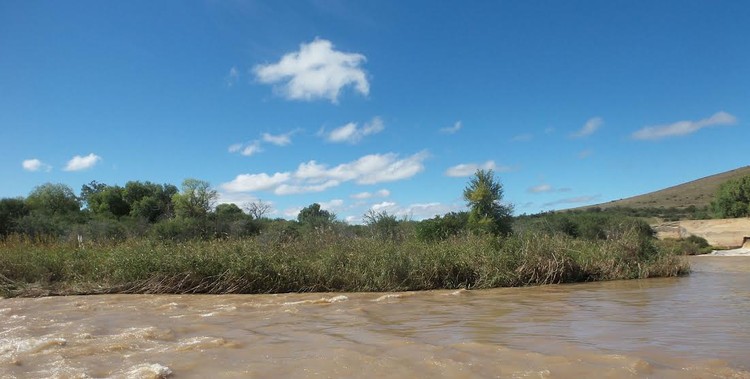
7 December 2022
The Fish River runs through part of Cradock, yet the little Eastern Cape town is facing a water crisis. Photo: Joseph Chirume
The Fish River flows through Cradock, but the little Eastern Cape town has been facing a water crisis since 2021. Several businesses have closed already and others may close too. The Department of Water and Sanitation blames the municipality; the municipality blames load-shedding.
The water supply is unpredictable. Sometimes water is off for days at a time, especially in the townships and high-lying areas. When GroundUp visited on 28 November, the industrial area was without water for a second day.
The chairman of the Cradock Business Forum, Wilhelm Smit, said Cradock was on a main road and depended on travellers, truck drivers and tourists. The town is on the N10 highway from Gqeberha to Upington in the Northern Cape and is also the junction of several other roads connecting Eastern Cape towns to Graaff-Reinet and the Western Cape.
“Travellers won’t stop if their basic needs are not met,” said Smit. “I am the owner of one of the filling stations, truck stop, restaurant and shops in this town. We are losing money due to the incompetence of this municipality. Truck drivers coming from mines stop to eat and wash their trucks, but without water none of their needs can be fulfilled.
“It is only a matter of time before they move their business elsewhere.”
He said the Lions motorcycle rally had already been moved to another town, depriving Cradock of “a huge financial injection”.
“How long will it be before the world-renowned [Fish River] Canoe Marathon will also be called off? Not everybody is able to afford backup water tanks for a basic need that Chris Hani District Municipality is supposed to deliver. [The municipality] is playing with people’s lives and the residents and business owners are fed up.”
Smit said a business in Cradock that employs more than 100 workers is threatening to close down.
“That is 100 families that will lose income. This would be the fifth business that will be closing as a result of high prices, electricity and water supply,” said Smit. He did not want to name the business.
Chris Hani District Municipality spokesperson Bulelwa Ganyaza said the water pumping system relied on electricity and load-shedding had reduced pumping hours. “The municipality sourced backup generators. However, the backup generators are not meant to be a primary source of energy, especially for operating a large-scale water pumping system.”
Ganyaza said high-lying areas like Hillside, Bergsig and the industrial zone faced water problems when reservoir levels were low due to load-shedding and high water demand in hot weather.
She said Cradock had old infrastructure which “was meant for a population that is not close to the size that the town currently has”.
Spokesperson for the national Department of Water and Sanitation, Wisane Mavasa, said load-shedding was part of the problem, but she said the municipality should fix water leaks and upgrade its ageing water system to combat massive water loss.
“The current water treatment works should also be refurbished or upgraded as it only received minor refurbishments over the last few years, but no actual upgrades,” she said.
The owner of Cradock abattoir, Eugene Kroucamp, who employs 93 people, said he had to close his business at times due to water supply issues.
Kroucamp said, “Water was a very problematic issue for us as we had 90,000 litres of water from the municipality that would only last us for a day and a half. Then we had to stop production, costing us a loss of around R80,000 per day.
He said he wouldn’t want to relocate. “But to invest? With the current situation in Cradock, I don’t think so.”